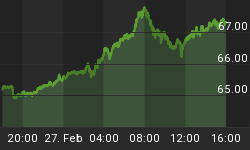"All is waves, with nothing waving, over no distance at all."
That’s a famous line in a fantasy duology describing the basics of magic. Interestingly, it also aptly describes quantum mechanics to a tee. In the rarefied world of quantum physics, the magic of quantum computing lies in incredibly powerful yet bizarre--and even slightly grotesque--machines such as the beast below, which looks more like a steampunk chandelier than anything remotely computer-esque.
Yet this machine is the most sophisticated quantum computer ever built by man (aliens could have yet beat us to the punch).
It’s powered by a 50-qubit (quantum bit) processor that follows the knotty rules of quantum physics--i.e., the wacky behavior of sub-atomic particles that make up our universe.
That elaborate tangle of supercooled tubes and electronics could be able to solve extremely complex algorithms that the current crop of supercomputers can barely handle.
It could potentially create breakthroughs in the most complicated data processing problems, revolutionize artificial intelligence, enable the development of new molecular structures and engineered drugs as well as perform fiendish analysis well beyond the capabilities of today’s binary computers.
Who knows, it might even be able to recreate the human brain or at least reverse engineer it.
On the flipside, quantum computers could turn cryptography and cybersecurity on their heads by cracking sophisticated encryption schemes.
Blazing the Trail
IBM is just one of the players in this moonshot and esoteric industry. Microsoft, Google and Intel have been building their own quantum devices over the past few years. So are federal governments, corporations and venture capitalists who have been investing in the technology. Related: Next-Gen Debit Cards Will Change Crypto Forever
On a national scale, the EU, UK, Canada and Australia are all investing in quantum technologies.
But in the race to quantum supremacy, two nations have emerged as the early leaders: the US and China.
Of course, the tech companies mentioned here are all proudly American. IBM has a working prototype, while Google seems to be making impressive progress. Then there’s the Los Alamos National Laboratory for Quantum Information Science, where government agencies are beginning to invest.
But bubbling quietly under is China, again.
China has reportedly invested a cool $10 billion in a huge quantum computing facility slated to open in 2020.
Although reports by Chinese publications should sometimes be taken with a pinch of salt, the fact that Beijing has already set out an ambitious plan to become a tech leader in 10 broad categories by 2025 could give credence to those claims.
Meanwhile, Alibaba, Tencent and Baidu are all investing heavily in the technology and starting to attract top talent.
The Challenge Ahead
Researchers laboring on the nascent technology have their work cut out for them. The current physics and engineering side is still quite messy (as you might have discerned from IBM’s device).
Related: What’s Behind Facebook’s Flip On Crypto Ads?
Current devices can only operate under ultra-low temperatures (just 10K, or 10 degrees above absolute zero) and in a vacuum no less. This limits their current applications to big labs that can provide the suitable conditions--meaning you won’t be able to order one of these processing demons from Amazon any time soon.
Further, programing a quantum computer is extremely finicky and challenging. The state-of-the-art IBM machine above can only hold the quantum state for all of 90 microseconds. That’s a record for the industry, but still too short to achieve much.
It might take a couple of decades before scientists can find a way to sustain the life of qubits and come up with working quantum computers. But whoever does it first will have the advantage in global tech domination.
By Michael Kern for Safehaven.com
More Top Reads From Safehaven.com:
















